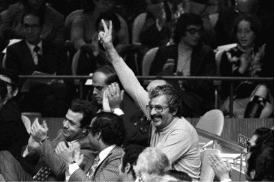Loading...
- Bseiso Family Archive
- Archives
- Affiliates
- Stories
- News
- About
Loading...
Published by Maximus Bissiccio
The Glimmer of Hope in Resolution 3236
/Historical Events
Updated October 30, 2024

In the late fall of 1974, something extraordinary happened at the United Nations—a global recognition of Palestinian rights that, for the first time, brought their struggle to the heart of international dialogue. With Resolution 3236, the General Assembly affirmed the Palestinian people’s "inalienable rights" to self-determination, independence, sovereignty, and return. For many Palestinians and their supporters, this moment was about more than diplomatic language or political maneuvers—it was a powerful recognition that their voices, struggles, and aspirations had value on the world stage.
Backed by a diverse coalition of countries, including the Soviet Union, China, France, and an overwhelming number of African, Asian, and Latin American nations, the resolution underscored the broad global support for Palestinian rights. Many of these countries, particularly from the Global South, were emerging from their own colonial histories and understood the weight of sovereignty and self-determination in a deeply personal way. They didn’t see the Palestinian issue as isolated but as part of a shared fight for justice and human dignity. Their support of Resolution 3236 was an act of solidarity that transcended politics, rooted in an understanding of loss, resilience, and the universal right to a homeland.
“For Palestinians, Resolution 3236 was a profound acknowledgment that their existence, history, and humanity mattered.”
However, what truly made Resolution 3236 historic was its effect on the international visibility of the Palestinian struggle. This wasn’t just about words on paper; it was about granting the Palestine Liberation Organization (PLO) observer status at the UN, allowing it to participate in discussions on global platforms. For the first time, Palestinians had an official voice in the most powerful diplomatic arena, representing their people’s rights and aspirations directly. Although they couldn’t vote, the PLO’s presence at the UN was significant—it was a sign that the world was starting to take their struggle seriously. For Palestinians, particularly those in refugee camps or living in exile, this recognition felt like a glimmer of dignity, a small yet profound acknowledgment that their existence, history, and humanity mattered.
The resolution also marked a shift in how the Palestinian issue was perceived. No longer was it only a regional conflict or a refugee crisis; it was about fundamental rights—freedom, identity, and the longing for a place to call home. By affirming the right of return, Resolution 3236 recognized the immense loss experienced by Palestinians forced to leave their homes. For those families, now spread across multiple generations, the right of return is deeply personal and painful. It’s about the olive trees planted by grandparents, the homes built by great-grandparents, and the memories passed down like family heirlooms. This right wasn’t just symbolic—it was an assertion of their history, identity, and belonging.
Today, Resolution 3236 still echoes for Palestinians. It’s a reminder of an international commitment to their rights, something that, despite the hardships and setbacks, still fuels their resolve. For young Palestinians in Gaza, the West Bank, and the diaspora, the resolution represents an international promise that their story matters. They still hold on to the hope of freedom, and the principles of Resolution 3236 give many a sense of validation that their dreams of a sovereign homeland are valid and worth striving for.
On a global level, the resolution continues to be a touchstone for solidarity. For those countries that supported it, standing with Palestine wasn’t about politics—it was about humanity. In a world that often overlooks the personal impact of conflict, Resolution 3236 is a reminder of the power of empathy and the need to address the Palestinian question as a human rights issue that’s far from resolved.
For the international community, this resolution is a call to remember the people behind the politics—the families displaced, the young people raised with stories of the home their grandparents lost, and the determination that keeps Palestinians hopeful. And as long as Resolution 3236’s values endure, so does the hope for justice and peace in Palestine.